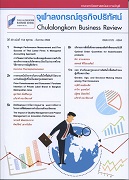ปริมาณการสั่งซื้อที่เหมาะสมของสินค้าที่ทดแทนกันได้
Main Article Content
Abstract
บทคัดย่อ
งานวิจัยนี้มีวัตถุประสงค์เพื่อศึกษาวิธีประเมินระดับการทดแทนกันของสินค้าประเภทกาแฟสำเร็จรูป สำหรับใช้ในการบริหารสินค้าคงคลัง และศึกษาเปรียบเทียบผลกำไรรวมและต้นทุนสินค้าขาดมือ ระหว่างแผนการสั่งซื้อสินค้าที่พิจารณาการทดแทนของสินค้ากับแผนการสั่งซื้อสินค้าที่ไม่ได้พิจารณาการทดแทนของสินค้า การประเมินระดับการทดแทนกันของสินค้าอาศัยข้อมูลยอดขายและสถานะคงคลังของสินค้าเป็นรายเดือน การบริหารสินค้าคงคลังใช้แบบจำลองระดับสินค้าคงคลังเป้าหมาย แต่การคำนวณระดับสินค้าคงคลังเป้าหมายประยุกต์จากแบบจำลองการสั่งซื้อครั้งเดียว โดยพิจารณาครั้งละ 1 ช่วงเวลาและมีแนวคิดที่ว่า ความต้องการสินค้าในแต่ละช่วงเวลาจะเพิ่มขึ้นจากความต้องการทดแทนสินค้าชนิดอื่นที่อาจจะขาดมือ ผลการศึกษาพบว่าเมื่อวางแผนโดยพิจารณาการทดแทนของสินค้าจะทำให้ผลกำไรรวมเพิ่มขึ้นและต้นทุนสินค้าขาดมือลดลง ข้อเสนอแนะจากงานวิจัยนี้คือ หากสินค้ามีการทดแทนกัน การบริหารสินค้าคงคลังควรพิจารณาการทดแทนของสินค้าด้วย หากสินค้าสามารถทดแทนกันได้มากขึ้น ผลกำไรก็มีแนวโน้มจะเพิ่มขึ้นตามไปด้วย
Abstract
This study aims to estimate substitutability among instant coffee products for inventory management and compare total profit and shortage cost of products between inventory policy with and without product substitution. Substitutability estimating requires only monthly sales transaction and product availability data. Inventory policy is based on order-up-to-level model but order-up-to level will be considered with single-period newsvendor model based on concept that a shortage in a particular product may increase the demand for its substitutable products. The study shows that inventory policy with product substitution results in total profit increase and shortage cost reduction. The results also indicate that total profit tends to increase when substitutability increase, so product substitution should be considered in inventory management.
Article Details

This work is licensed under a Creative Commons Attribution-NonCommercial-NoDerivatives 4.0 International License.
Opinions and discussions in papers published by the Creative Business and Sustainability Journal (CBSJ) are deemed as personal opinions and the responsibility of the writers. They are not the opinions or responsibility of the Chulalongkorn Business School of Chulalongkorn University.
Papers, content, information etc. appearing in the Journal are deemed to be the copyright property of the Chulalongkorn Business School of Chulalongkorn University. Anybody or any organization that wishes to publish any part of them or use them in any way must obtain written permission from the Chulalongkorn Business School, Chulalongkorn University.


